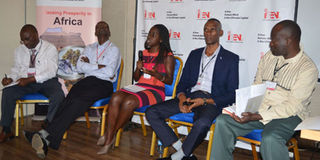Regional entrepreneurs root for digitalization of informal industry

L-R: Gaston G. Kikuwi, Chairperson, VIBINDO (Jumuiya ya Vikundi vya Wenye Biashara Ndogondogo), Dar es Salaam Tanzania; Fredrick Dawa, General Secretary Micro and Small Enterprises Authority Leaders’ Summit, Nairobi; Akinyi Ooko-Ombaka, Pro Engagment Manager and executive director Focal Point; Lynk Kenya
Mwesigye Abel, CEO. Kampala City Traders Association (KACITA); Dr Douglas Kivoi, Senior Policy Analyst, The Kenya Institute for Public Policy Research and Analysis (KIPPRA) Kenya
What you need to know:
- While the informal sector has contributed significantly to job creation, poverty alleviation, and contribution to the GDP of East African countries ( 22 percent for Kenya, 20 percent for Uganda, 28 percent for Tanzania and 5percent for Rwanda), emerging disruptive technologies have made ‘informal’ indutry not to be synonymous to the streets and automatically defaulting to the marginalized or vulnerable.
Regional entrepreneurs have called for digitalization of East Africa’s informal industry on grounds that digital technologies are opening up new opportunities for the sector to innovate and grow.
“Even though the informal sector represents a major part of most of the East African countries, it is typically stigmatized. It is seen as unmanageable and also extremely troublesome and yet it provides vital economic opportunities for those at the bottom of the socioeconomic ladder. A change in mindset is critical for the informal sector players to effectively compete on the global markets,” Mr Mwesigye Abel, the chief executive officer Kampala City Traders Association (KACITA) said during a meeting of over 30 operators in the informal industry drawn from Kenya, Uganda and Tanzania in Nairobi last week.
The entrepreneurs had converged to discuss the Future of Africa's Informal Industry in the Era of Digitalization in a forum organized by the Inter Region Economic Network (IREN) in collaboration with the Friedrich Naumann Foundation for Freedom (FNF).
Dubbed the 17th Africa Resource Bank Forum, the event aimed to explore the current state of East Africa’s informal industry and how the sector can leverage on emerging technologies to grow and garner profits.
The EAC Industrialization Strategy aims at diversifying the manufacturing base and raise local value-added content of resource-based exports to at least 40 percent by 2032.
It also aims at transforming micro, small and medium enterprises into viable and sustainable business entities capable of contributing to at least 50 percent of manufacturing GDP up from 20 percent base rate.
Other Participants included informal sector representatives from VIBINDO (Tanzania), Uganda Traders Support Association (TSAU), Kenya Jua Kali Associations and Kenya Association of Manufacturers, among others.
“There is need to close the digital divide for our enterprises to be competitive in the global market,” said Stefanie Steinbach, Head East Africa Office of the Friedrich Naumann Foundation for Freedom (FNF).
“Digital technologies are opening up new opportunities for the informal sector to innovate and grow. It is important we foster inclusive multi-sectoral collaboration to tap into the opportunities of this sector,“ said Tobias Alando, head of membership and board affairs, Kenya Association of Manufacturers (KAM).
According to Mr Baganzi Solomon of Uganda Traders Support Association (TSAU) economic informality actors should be assisted to leverage on emerging ‘disruptive’ tools to stay relevant in the rapidly digitizing world.
He added that it must be done in an inclusive and sustainable manner.
While the informal sector has contributed significantly to job creation, poverty alleviation, and contribution to the GDP of East African countries ( 22 percent for Kenya, 20 percent for Uganda, 28 percent for Tanzania and 5percent for Rwanda), emerging disruptive technologies have made ‘informal’ indutry not to be synonymous to the streets and automatically defaulting to the marginalized or vulnerable.
The street has been scaled to WhatsApp, SMS, Web portals, Instagram, calls and Facebook groups while production is increasingly becoming digital and automated.
Consequently, the emerging group of informal actors are vastly different from the traditional informal economic actors. They comprise today’s millennial and post millennial digital natives – educated, learned, tech savvy and adaptive to global trends.




